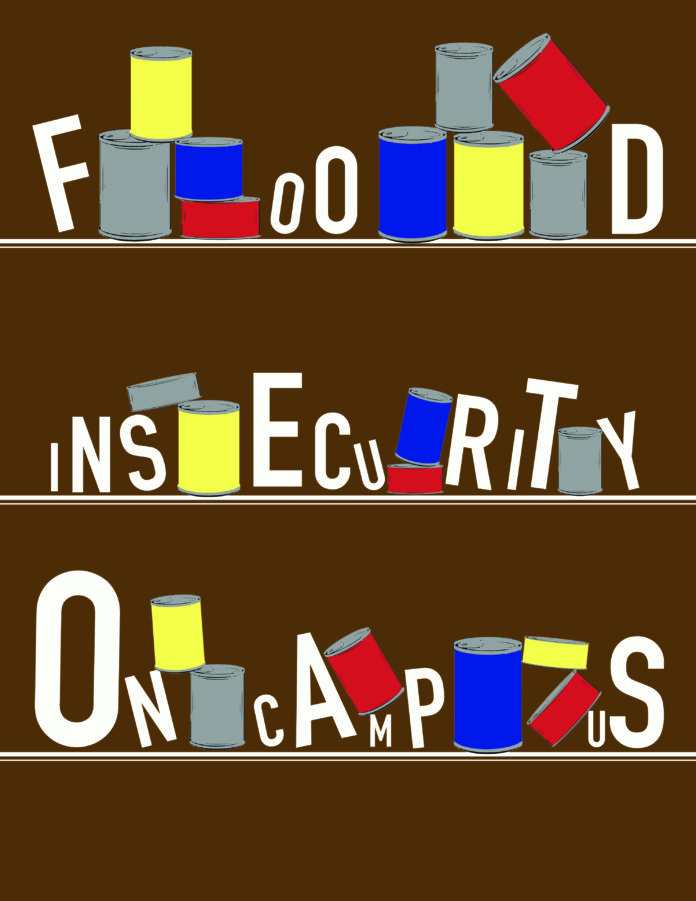By Katie Stewart | Reporter
Dr. Matt Bradshaw, assistant professor of sociology, included a “Food Pantry” section on his fall 2018 syllabus.
Bradshaw acknowledged that people might assume, because Baylor is a private institution, that its students don’t struggle to access food. On the contrary, his syllabus reads, “Given that Baylor is an expensive private school, most people assume that our students have plenty of food, and that they never go hungry. This assumption is false and quite a few Baylor students (perhaps 10 to 20 percent) suffer from food insecurity. I have a small food pantry in my office, and I will do my best to keep it stocked with soup, sandwiches, fruit and various snacks. This is free for anyone who wants/needs something to eat.”
Sue Mock, an Atlanta senior and former student of Bradshaw’s population health course agreed that food insecurities are present on Baylor’s campus. For Bradshaw’s spring course, she was required to do a presentation related to sociology and was inspired to focus on the issue of student hunger.
“I always had something in my heart about people who don’t have enough food, so my presentation was on food insecurities on college campuses,” Mock said.
A pool survey from student contacts gathered by Bradshaw showed that approximately 30 percent of 183 Baylor student participants agreed with the survey statement: “I do not have enough money to maintain a healthy diet.”
According to a national survey by Wisconsin HOPE Lab, “36 percent of university students were food insecure in the 30 days preceding the survey.” The study defined food insecurity as “The limited or uncertain availability of nutritionally adequate and safe foods, or the ability to acquire such foods in a socially acceptable manner. The most extreme form is often accompanied with physiological sensations of hunger.”
Bradshaw said he had already been giving food to students, but it was Mock’s research that solidified his decision to place information about the food pantry on his syllabus.
“I have always brought food to class, but I never really thought about food insecurity being a problem until Sue brought this to my attention,” Bradshaw said. “So this is the first semester I have listed it on my syllabus. I probably should have recognized this sooner, because I have routinely received emails like these (direct quotes from students): ‘You were the only professor that I felt that understand us as students and knew how much we struggle through college. The days you brought us food and paid from your own budget were incredible.’”
The Store, a Baylor food pantry in the basement of the Bill Daniel Student Center, is a place where students can find food, toiletries and school supplies with their Baylor student ID. Baylor also has fresh produce during their free farmers market each semester.
However, Mock suggests that just offering food assistance once a semester isn’t enough. After learning about food insecurities through her research, Mock and Bradshaw wanted to revisit and augment the research in order to do more about students’ food insecurity and present it to Baylor.
“We talked about taking it to the next step. There is a clear need and there is a very clear awareness, but I think there’s all these different [faculty and departments] doing their own thing and not bringing it all together,” Mock said.
During her research, Mock thought about ways to pool unused dining dollars and ways to transfer the unused amounts to students in need. She also considered an app where students could anonymously connect with other students in or outside dining halls in order to transfer a swipe for a meal on campus.
“Who do you even take it to? Who is the person that can decide to change and say, ‘Yes, we are going to get an app; we’re going to get a big store …’ Who do you make a presentation to?” Mock said.
Mock will be graduating in the spring and aims to continue working with Bradshaw to support initiatives on fighting hunger issues at Baylor.






